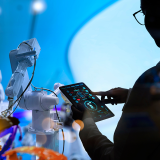
Anticiperen op en omgaan met de gevolgen van verandering
Het anticiperen op en omgaan met de gevolgen van verandering is een van de zes hoofdactiviteiten in het werkprogramma van Eurofound voor de periode 2021-2024. Eurofound zal bewijsmateriaal verstrekken over structurele ontwikkelingen die van invloed zijn op de economie en de arbeidsmarkten van de EU en die voornamelijk het gevolg zijn van de digitalisering en de overgang naar een koolstofneutrale economie , maar ook van de COVID-19 -crisis. Het onderzoek is bedoeld om beleidsmakers bij te staan bij het anticiperen op en voorbereiden van de Europese arbeidsmarkten en werkplekken op deze veranderingen.
Vanaf 2021 zal Eurofound inzicht verschaffen in de impact van deze megatrends op de levens- en arbeidsomstandigheden in de EU. Op het gebied van digitalisering zal het onderzoek zich toespitsen op de gevolgen voor de werkgelegenheid, de arbeidsomstandigheden en de arbeidsmarkt. Hieronder vallen onder meer de sociale dialoog en de rol daarvan bij het vormgeven van structurele veranderingen, regelgevingskaders, sociale bescherming en kunstmatige intelligentie (AI). Voortbouwend op eerder onderzoek naar platformwerk zal de periode 2021-2024 gelegenheid bieden om de aandacht te richten op het in kaart brengen en beoordelen van de doeltreffendheid van beleidsinitiatieven bij het aanpakken van de uitdagingen die op het gebied van platformwerk zijn geconstateerd.
Eurofound zal ook de overgang van de EU naar een koolstofneutrale economie, met inbegrip van de circulaire economie en de tenuitvoerlegging van het EU-herstelinstrument NextGenerationEU, ondersteunen door de sociaaleconomische effecten te onderzoeken. Daarbij gaat het onder meer om verschuivingen in de werkgelegenheid en de transformatie van banen en arbeidsomstandigheden, alsook om verdelingseffecten van het klimaatveranderingsbeleid. Sommige van deze werkzaamheden zullen voortbouwen op de resultaten van een door Eurofound uitgevoerd proefproject over de toekomst van de productie (FOME) .
Om deze werkzaamheden in 2021-2024 voort te zetten, zal Eurofound samenwerken met verschillende internationale organisaties en EU-agentschappen, bijvoorbeeld met het Europees Milieuagentschap (EEA) op het gebied van de sociale gevolgen van het klimaatveranderingsbeleid. Voorts zal de bestaande samenwerking met andere onderzoeksactoren op het gebied van digitalisering — het Gemeenschappelijk Centrum voor onderzoek (JRC), het Bureau voor de grondrechten (FRA) en het Europees Agentschap voor veiligheid en gezondheid op het werk (EU-OSHA) — worden geconsolideerd. Er is ook voorzien in een verder partnerschap met de Internationale Arbeidsorganisatie (IAO) met betrekking tot de veranderende arbeidswereld.
“De economie en arbeidsmarkten van de EU worden gekenmerkt door de impact van megatrends, met name digitalisering en de overgang naar een koolstofneutrale economie. Het is belangrijk om na te gaan hoe deze transities precies werken, wat er verandert en welke gevolgen zij niet alleen voor bedrijven zullen hebben, maar ook voor de werknemers en de samenleving.”
Irene Mandl, hoofd van de eenheid Werkgelegenheid































